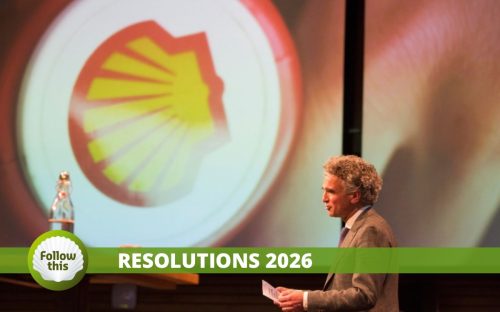– PRESS RELEASE –
BP still expects its emissions to grow this decade – in collision course with ‘Paris’ that demands substantial reductions
BP has no plans to revise its insufficient climate strategy. The below questions about Paris-alignment by Follow This remained unanswered during the Q2 results Q&A today. “Apparently, BP hasn’t digested the shareholder rebellion of last AGM yet, when an unprecedented 21% of its shareholders urged BP to advance its climate targets to Paris-alignment, which means a substantial emission cut instead of a rise,” says Mark van Baal, founder of Follow This, that filed the climate resolution.
“We fail to understand that the BP leadership still thinks the company can increase emissions while claiming to be Paris-consistent. A growing number of investors votes for an immediate decrease of emissions, not by 2050.”

Questions by Follow This
Bernard and Murray, congratulations on these financial results in your fossil fuel business.
To put the Paris goal within reach, the fossil fuel industry needs to substantially shift investment to substantially decrease emissions this decade.
To offer shareholders transparency and clarity about your climate ambition, we have two crucial questions:
- Do you still expect BP’s absolute level of GHG emissions to grow between now and 2030? (Scope 1, 2, and 3 – source at * below)
- What percentage of BP’s investments will be in renewables and what percentage in fossil fuels in 2022 and 2023? Thank you for your answers, Mark van Baal, Follow This
Shareholder rebellion at AGM
In May, a significant number of shareholders (21%, up from 8% in 2019) voted in favour of the Follow This climate resolution at the BP AGM, despite the board’s advice to vote against. This discontent stands out compared to the other 12 resolutions where up to 99% of shareholders obeyed board advice.
“Once again, responsible investors have given a clear signal to the Board of BP,” said Mark van Baal of activist shareholder Follow This, who tabled the climate resolution. “They’re saying we do not accept empty promises for the distant future anymore, we need you to act now.” BP plans involve an increase in emissions by 2030.
“Saying that you’re Paris-aligned isn’t enough to appease investors anymore.”
“We are disappointed BP didn’t heed this message from investors. Increasingly, investors recognize the need for immediate emission reductions.”
“In 2019, 8% compelled BP to set emission reduction ambitions for its product (Scope 3). May’s 21% will hopefully compel BP to advance these ambitions to Paris-consistent emission reduction targets and – consequently – shift investment away from fossil fuels to renewables.”
“We thank all the institutional investors that voted for our climate resolution, including a majority of the ten largest Dutch investors. These investors are the change agents of oil and gas companies.”
“Oil major boards rarely take the initiative to move on their own. The shareholders have to compel them to set targets, and have to support them to attain these targets.”
Joint resolution stumbled on BP’s plan to increase emissions
The board of BP recommended shareholders to vote against the Follow This resolution (resolution 13, AGM notice of meeting, page 24), despite efforts to write a joint resolution, as both parties agreed in 2020. Negotiations did not result in a joint resolution as BP wanted a resolution that supports its current climate aims, that increases absolute emissions in this decade, while Follow This maintained its ask for Paris-consistent targets. “Increasing emissions was off-limits for Follow This.”
IPPC: substantial emission reductions by 2030
“An oil major without reduction targets for all emissions this decade, can not claim commitment to the Paris Climate Agreement,” says Mark van Baal. The Paris Climate Agreement requires emission reductions of 45% by 2030, according to scenarios of the Intergovernmental Panel on Climate Change (IPCC).
Back to the drawing board
“Going back to the drawing board on strategy, targets and aims would disrupt our business plans,” BP reasoned in the Notice of Meeting (page 24).
“This is exactly what shareholders request of BP by voting in favour of resolution 13: BP should go back to the drawing board and disrupt its current business plans, which involve an increase in emissions, in order to protect investors’ assets from climate change.”
Fair ask
“We do not ask oil majors to stop with fossil fuels tomorrow, but we request them to start investing in renewables today. Our fair-ask is that oil majors commit to Paris by setting reduction targets for all their emissions, no more, no less. We thank the investors for their support for this necessary step to achieve the Paris Climate Agreement, and do not accept BP’s stalling of climate action. The oil industry can make or break the Paris Climate Agreement.”
Thanks to investors
“More and more institutional investors want all companies at which they are shareholders to commit to Paris,” Van Baal said. “Because they foresee that they cannot make a decent return on their capital in a world economy disrupted by devastating climate change.”
“We will make sure emission reductions stay on the agenda until the energy transition is achieved. We will continue our mission: make sure the oil and gas industry makes instead of breaks the Paris Climate Agreement.”
“We thank these investors for their vision and tenacity. Concrete targets are imperative. We don’t have time for another round of non-committal ambitions or vague discussions about 2050. We need oil majors to shift investments to decrease emissions within this decade,” says Van Baal.
“Bernard Looney, the CEO of BP, has been talking about climate action since he took the helm of the company in the beginning of 2020. Investors want to hear that emissions will go down and investments in renewable energy will go up within this decade.”
Climate targets to decrease absolute emissions necessary
“We believe that only concrete targets for all emissions will lead oil majors to the necessary shift in investments from fossil fuels to renewables,” says van Baal.

* BP expects “the absolute level of emissions to grow between now and 2030, even as the carbon intensity falls” (Reimagine Energy, slides & script).
BP’s “net-zero by 2050” ambition only covers its own production, BP’s carbon footprint (produced and traded emissions) will only halve by 2050.
Climate Resolution 13
‘Shareholders support the company to set and publish targets that are consistent with the goal of the Paris Climate Agreement: to limit global warming to well below 2°C above pre-industrial levels and to pursue efforts to limit the temperature increase to 1.5°C.’ full text











